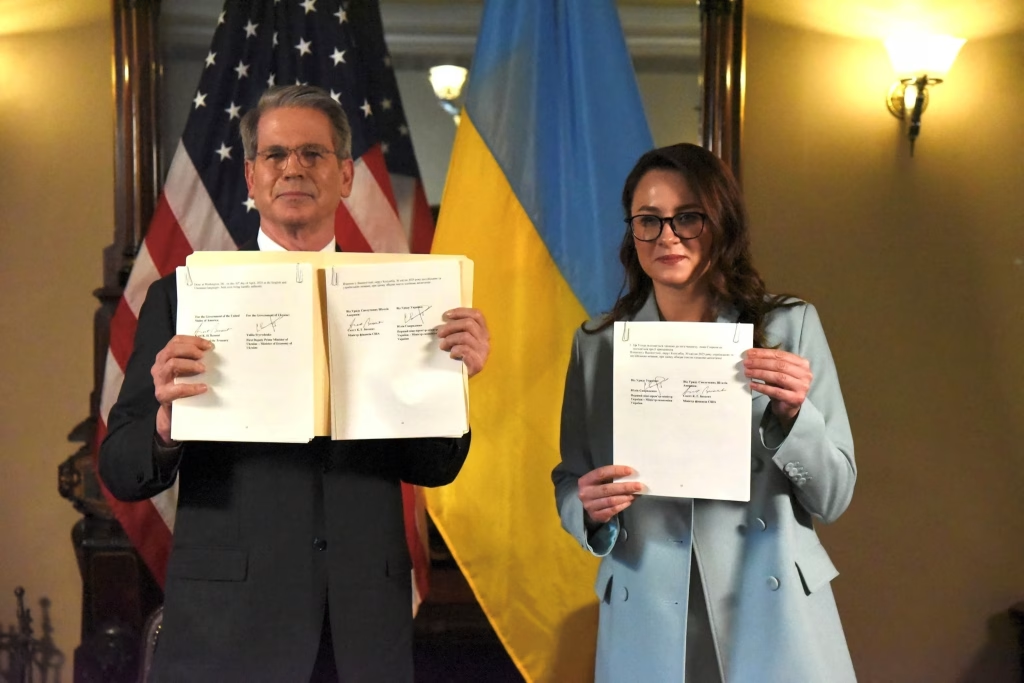The United States and Ukraine have signed a long-delayed minerals agreement, signalling a shift in Washington’s approach to supporting Kyiv under President Donald Trump’s administration, which has sought to reduce military aid and push for economic arrangements instead. The deal was announced on Wednesday after months of negotiations and is seen as a new form of US commitment to Ukraine, focusing on long-term investment and resource development.
The agreement grants Ukraine full sovereignty over its rare earth minerals—vital components in the production of modern technologies—while also establishing a joint Reconstruction Investment Fund. This fund will have equal voting rights for both countries, and profits will be reinvested solely into Ukrainian development projects. Ukraine retains complete control over its natural resources, infrastructure, and subsoil under the terms of the deal.
President Trump had initially demanded a share of Ukraine’s vast mineral wealth as compensation for the billions in military assistance provided during Joe Biden’s presidency following Russia’s full-scale invasion in February 2022. While Ukraine initially resisted this idea, the agreement was eventually accepted as a strategic move to attract US investment and secure post-war reconstruction.
At the signing in Washington, US Treasury Secretary Scott Bessent described the accord as a symbol of both nations’ dedication to peace and prosperity. He stated that the deal “sends a clear message to Russia” about the Trump administration’s enduring support for a free and sovereign Ukraine. He also made it clear that individuals or entities involved in funding Russia’s war machine would not benefit from Ukraine’s recovery.

The Treasury’s statement notably acknowledged Russia’s “full-scale invasion” of Ukraine, marking a rare departure from the Trump administration’s usual rhetoric, which has at times suggested Ukraine bore significant responsibility for the conflict.
Ukrainian Prime Minister Denys Shmygal welcomed the agreement, calling it “fair, equal and advantageous.” He emphasised that Ukraine would not be required to repay any form of debt for previous US support, a crucial point of concern for Kyiv.
Ukraine’s Economy Minister Yulia Svyrydenko added that the partnership would fund mineral exploration, oil and gas ventures, and related infrastructure projects. The agreement is seen as critical in unlocking Ukraine’s underdeveloped resources, which include major reserves of graphite, manganese, titanium and lithium. Ukraine is estimated to hold about five percent of the world’s mineral and rare earth reserves, with around 20 percent of global graphite deposits—an essential material for electric vehicle batteries.
President Trump, who remains opposed to offering Ukraine any security guarantees or NATO membership, said the physical presence of American personnel linked to the mining projects could deter malign actors in the region. At a cabinet meeting, he said such a presence would “keep a lot of bad actors out” of key resource zones. In a subsequent interview, Trump told NewsNation that he had recently encouraged Ukrainian President Volodymyr Zelensky to approve the deal, calling it a “very good thing” given Russia’s military strength.
When asked whether the deal might serve as a deterrent to Russian President Vladimir Putin, Trump replied, “Well, it could.”
Meanwhile, Secretary of State Marco Rubio warned that the US might abandon mediation efforts unless both sides present concrete proposals. Trump has been pushing for a peace deal that includes territorial concessions to Russia, a position the Kremlin has thus far rejected. Despite this, President Zelensky—under pressure after a tense February meeting with Trump and Vice President JD Vance—has made efforts to publicly support Trump’s diplomatic initiatives while holding firm against surrendering any part of Ukraine, including Crimea.
Critics, however, have not held back. Democratic Congressman Gregory Meeks condemned the agreement, referring to it as “Trump’s extortion of Ukraine deal” and urging the president to turn his attention toward pressuring Putin instead of targeting Zelensky.
Many of Ukraine’s most promising mineral sites remain untapped or are situated in areas currently occupied by Russian forces, raising further questions about the feasibility of extracting and exporting these valuable resources in the near term.


 Trending
Trending 






